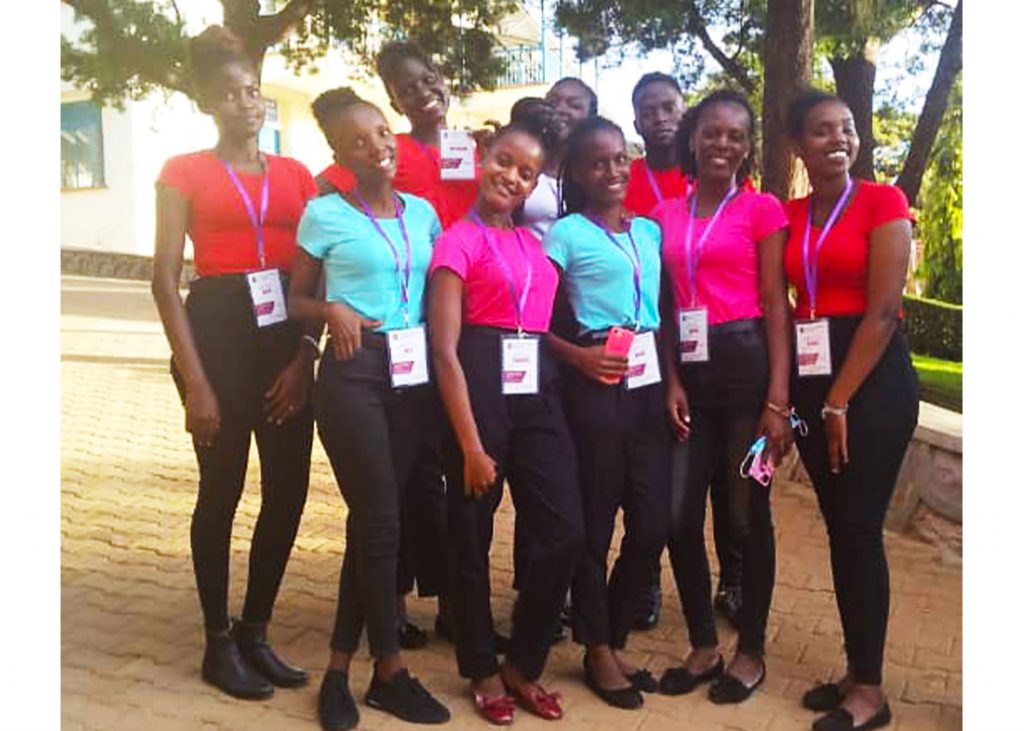By Eriah Lule
Save the Mothers Department held its Reproductive Health, Maternal, Newborn, Child, and Adolescent Health conference; it was both online and physical in Nkoyoyo Hall at UCU-Mukono.
As guests arrived and settled in, a number of good-looking and smartly dressed ushers in pink, sky blue, and red t-shirts were always at their service to give them a hand where one was required.
They all looked young and gallant. One would say they were passionate about what they were doing. “You mean UCU has started calling in ushering services for its functions or is it just Save the Mothers?” a guest whispered to the colleague.
The high level of professionalism held at that particular event left everyone in astonishment but only left the questions to be tackled by Dr. Miriam Mutabazi, the Head of Department Save the Mothers and Dean Faculty of Public Health, as to how they could access this company’s services.
To smaller groups who tried to talk to them or look at them after pulling their masks down, surprisingly were the Bachelors of Tourism and Hospitality Students with their lecturer, Nakanwagi Patricia, who was dressed in a suit, a clear indication that she was the team leader.
This clearly edified UCU’s theme statement, “A complete education for a complete person.” This club was started in the fall of April by Patricia so as to impart out-of-class professional skills for her students and also network as they are still studying. The club is called Noble Ambassadors under the School of Business and was backed by the Dean, Mr. Vincent Kisenyi, for its establishment.

According to Kisenyi, the club is to back the course, which is a package of a concept called MICE (Meetings, Incentives, Conferences and Events), a virgin area that has not been explored by many professionals in the tourism and hospitality section of the country. “The course is very rich and has very many areas where our students would specialize as professionals, a platform that this group is targeting.” He said
Mooting an idea to have a club whose primary purpose is not to make money but to train students is now among the school’s many empowerment projects, he added.
Nakangwagi saw a very big gap that needed to be addressed as soon as possible not only in the industy but also within the academic setting. “Most of the students stand confused even after graduating on how they would apply what they learnt. They only wait for their employers, which is wrong,” she said. “We want to at least use such clubs if established at the school level to engage and expose our students to the field early before they even graduate.”
Among the many visions for this club by the school is to register it as an events company that would be employing students as well as exposing them to the field. “Now it would be easy to network and to impart them with skills to fight the high levels of unemployment among young people,” Patricia said.

Shanitah Nabulya, a second-year student offering a Bachelors of Tourism and Hospitality Management, believes that the club doesn’t only impart them with skills but builds their confidence and brand in the field. “Our field requires a lot of creative and confident professionals, and the club has given us a platform to build it,” she said. “With only one event, we have already managed to successfully network.” So how about in the next 5 years with the support from the administration? “
“I was very satisfied by the high level of professionalism that they exhibited on that day. I actually didn’t know that they were students,” said Dr. Miriam Mutabazi. “With this kind of club, it’s not only going to market the course but also the school and the university as a whole.”


